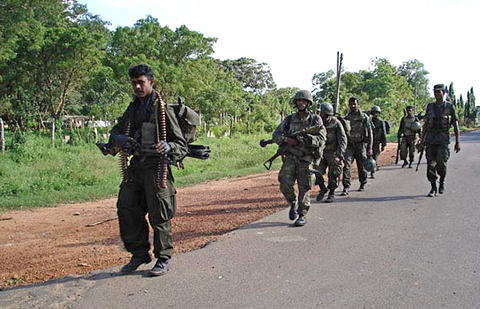Sri Lankan troops advanced yesterday on the military headquarters of the Tamil Tigers, a day after capturing the rebels’ de facto political capital in the north of the island.
The Sri Lankan Defense Ministry said forces were moving towards Mullaitivu, the jungle district along the northeastern seaboard, where the Tigers are known to have their main military facilities.
“The battle for Mullaitivu has already begun,” the ministry said in a statement.

PHOTO: AFP
The air force used Mi-24 helicopter gunships to carry out two bombing raids yesterday in support of the advancing ground troops, a military spokesman said.
He said 10 such missions were carried out on Friday.
The ministry said that government troops were also moving further north of their positions in Kilinochchi in a bid to retake the strategically vital Elephant Pass, which was lost to the Tigers in April 2000.
Elephant Pass lies at the entrance to the Jaffna Peninsula, which security forces wrested from rebel control in 1995.
On Friday, after months of intense fighting, the military finally captured Kilinochchi, where the Liberation Tigers of Tamil Eelam (LTTE) had gathered all the political trappings of a mini-state.
Military officials said the fall of Kilinochchi had cleared the way for security forces to re-establish control over a vital highway linking the northern Jaffna Peninsula with the rest of the country.
Jaffna, which has a population of nearly half a million people and a considerable military presence, used to be supplied by air and sea because the Tigers controlled the land route.
Sri Lankan President Mahinda Rajapakse called the army’s capture of Kilinochchi an “unparalleled victory” for the entire nation and urged the rebels to lay down their arms and end their decades-old struggle for a separate homeland.
Street celebrations took place in the capital Colombo and elsewhere as news of the town’s capture broke.
But just hours later, a suspected Tiger suicide bomber attacked an air force base in the capital Colombo, killing at least two airmen and injuring 36 others.
The Tigers admitted losing Kilinochchi, but argued that the town had been abandoned rather than captured.
“The Sri Lanka army has entered a virtual ghost town as the whole civilian infrastructure as well as the center of the LTTE had shifted further northeast,” the Tigers said through the pro-rebel Tamilnet Web site.
While losing Kilinochchi is a major setback, the Tigers have shown in the past that they have the ability to rebound.
The Tigers initially lost Kilinochchi in 1996 and retook the area two years later and controlled it till they were driven out on Friday.
Barely six months after government troops captured the northern Jaffna Peninsula in 1995, the Tigers overran a military base in Mullaittivu, killing more than 1,200 soldiers.
The guerrillas also reversed military gains of 19 months in a matter of five days in November 1999, going on to dislodge the military from their Elephant Pass base at the entrance to Jaffna.
In his annual speech in November, LTTE leader Velupillai Prabhakaran vowed to defend his territory and suggested that the rebels would revert to guerrilla-style, hit-and-run attacks as their area shrank.
The Tigers have been labeled a terrorist group by the US, the EU and India, but had the backing of the international community when Oslo-backed peace talks got under way in 2002.
The peace process virtually ended when the government formally pulled out of a moribund truce last January.
The Sri Lankan conflict over the Tigers’ demand for a separate Tamil homeland has claimed tens of thousands of lives since 1972.

FEROCIOUS FISH-EATER Scientists have found a new species of dinosaur from the Cretaceous Period, a ‘hell heron’ that stalked the rivers, deep in the Saharan desert At a remote Sahara desert site in Niger, scientists have unearthed fossils of a new species of Spinosaurus, among the biggest of the meat-eating dinosaurs, notable for its large blade-shaped head crest and jaws bearing interlocking teeth for snaring fish. It prowled a forested inland environment and strode into rivers to catch sizable fish like a modern-day wading bird — a “hell heron,” as one of the researchers put it, considering it was about 12 meters long and weighed 5-7 tons. The dinosaur presented a striking profile on the Cretaceous Period landscape of Africa some 95 million years ago as it hunted

‘COST OF DEFECTION’: Duterte’s announcement could be an effort to keep allies in line with the promise of a return to power amid political uncertainty, an analyst said Philippine Vice President Sara Duterte yesterday announced she would run for president of the Southeast Asian nation of 116 million in 2028. Duterte, who is embroiled in a bitter feud with Philippine President Ferdinand Marcos Jr, was impeached last year only to see the country’s Supreme Court throw the case out over procedural issues. Her announcement comes just days before her father, former Philippine president Rodrigo Duterte, begins a pretrial hearing at the International Criminal Court (ICC) in the Netherlands over crimes against humanity allegedly committed as part of a brutal crackdown on drugs. “I offer my life, my strength and my future

NOT YET THERE: While the show was impressive, it failed to demonstrate their ability to move in unstructured environments, such as a factory floor, an expert said Dancing humanoid robots on Monday took center stage during the annual China Media Group’s Spring Festival Gala, China’s most-watched official television broadcast. They lunged and backflipped (landing on their knees), they spun around and jumped. Not one fell over. The display was impressive, but if robots can now dance and perform martial arts, what else can they do? Experts have mixed opinions, with some saying the robots had limitations and that the display should be viewed through a lens of state propaganda. Developed by several Chinese robotics firms, the robots performed a range of intricate stunts, including martial arts, comedy sketches and choreographed

DRUG WAR: The former president said there was no campaign to kill addicts, but his speeches called for violence and told police to use lethal force if necessary Former Philippine president Rodrigo Duterte earned global infamy for the deadly drug crackdown that led to his arrest over crimes against humanity charges, despite his huge popularity at home. A profane-lipped populist and self-professed killer, Duterte’s anti-crime campaign resulted in the deaths of thousands of alleged dealers and addicts. Rights groups said many of those killed were poor men, often without any proof they were linked to drugs. Yet, while drawing condemnation abroad, tens of millions of Filipinos backed his swift brand of justice — even as he joked about rape in his rambling speeches, locked up his critics and failed to